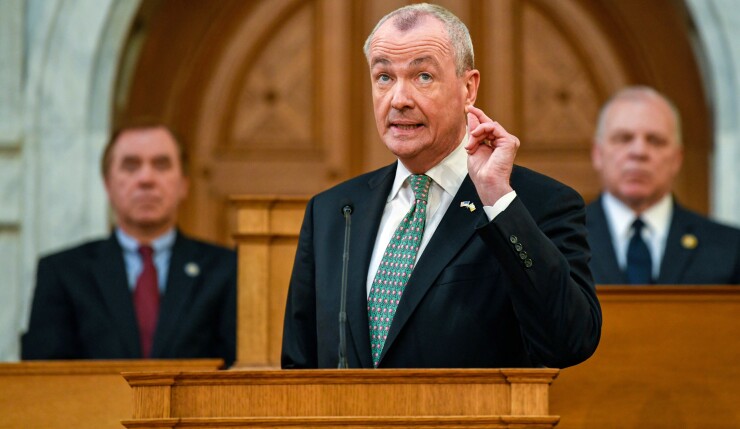New Jersey Gov. Phil Murphy wants to take advantage of the Fed's new powers to purchase municipal debt.
With the state facing a revenue shock because of the COVID-19 pandemic, Murphy said last week he wants lawmakers to consider a proposal for the U.S. Federal Reserve to purchase municipal bonds from the state.
The Democratic governor didn’t say how much he wants to borrow, but noted that the central bank’s

"This is something that I feel personally pretty strongly we need to have as a tool in our toolkit," Murphy said during his COVID-19 press briefing Thursday. “We are going to have serious cash flow challenges.”
The Murphy administration sent draft legislation for the “New Jersey COVID-19 Emergency Bond Act” last week detailing how the measure would grant special borrowing powers normally restricted by the state. While New Jersey’s
The debt proposal would authorize the issuance of general-obligation bonds and “emergency liquidity notes” along with applying for loans from the federal government. The borrowing would be repaid through sales and property tax revenues. New Jersey's current 6.625% state sales tax and local property taxes collected by municipalities would be increased if funds were insufficient to meet debt payments.
The bonds would have to be repaid no later than 35 years after issuance and may be subject to redemption prior to maturity.
New Jersey lawmakers agreed in early April to
Murphy’s initial $40.9 billion budget proposal released on Feb. 25 before the COVID-19 crisis took hold hinged largely on $500 million of estimated revenue from a millionaire’s tax the governor has faced resistance on since assuming office in 2018. He
New Jersey’s general obligation bonds are rated A3 by Moody’s, A-minus by S&P and A by Fitch Ratings and Kroll Bond Rating Agency. Moody’s revised the state’s credit outlook to negative from stable citing the COVID-19 impact on revenues. Only Illinois has lower state GO ratings.
Regina Egea, president of the conservative-leaning Garden State Initiative, cautioned against bonding to solve revenue problems. She noted that Atlantic City tried this approach following the 2008 financial crisis and the gambling hub is still trying to recover from its debt load.
"The concept of issuing bonds to pay today's bills is shortsighted and will leave New Jersey at a disadvantage tomorrow,” Egea said. “Our leadership must prioritize health spending items and focus on policies that will grow our economy — not add significant debt for years to come."





